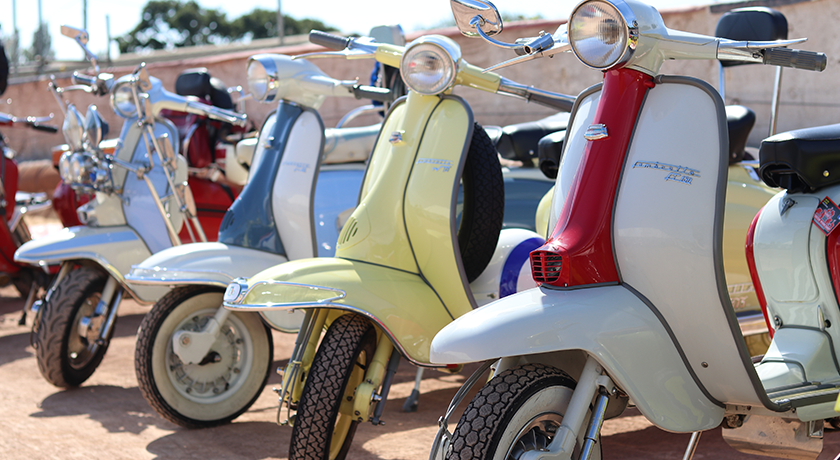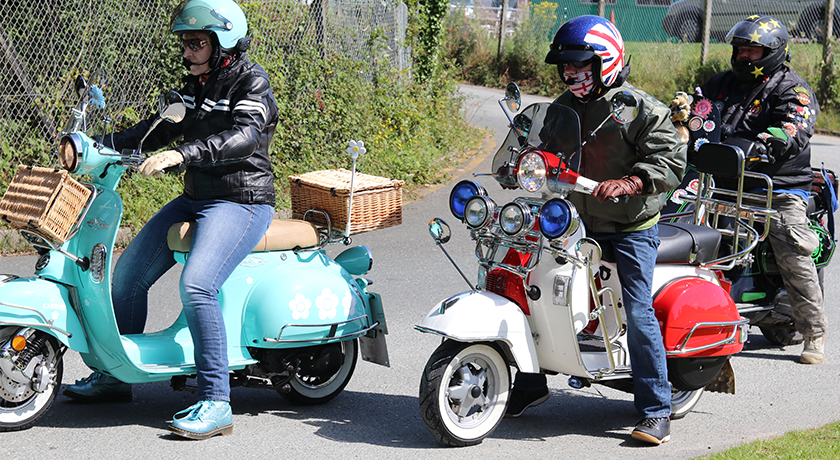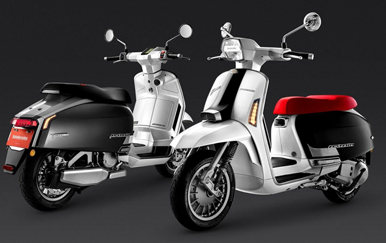Modern new scooters and the new electrical alternatives are great for getting you around in a reliable yet economical way. However, I think it is fair to say that for a lot of people, you cannot beat a classic machine.
Packed with soul, character, and charm a modern scooter could never compete with, there is a reason why so many people chose to opt for classic.
In this blog, we will be running through everything you need to know when going through the process of purchasing yourself a retro beauty, so without further ado - Let’s get into it, shall we?
Buying a classic scooter doesn’t have to be a challenge

1. Do your research
If you are new to the scooter scene, it would be worth trying to learn as much as possible about the different models before purchasing the first one you see.
There are plenty of nice-looking imports out there from Vietnam and India, however, what is underneath the spectacular paintwork can be something quite different. Welded-together frames, engine internals fabricated from baked bean cans, and components well past their best are just some of the horrors disappointed buyers have come across.
Lastly, if you are ever unsure about a potential purchase it is worth heading over to internet forums or Facebook scooter groups and getting their opinion before you decided to depart with your hard-earned cash.
2. Be careful when buying without a registration
Whilst it is fairly common to buy classic scooters without their registration documents, you must make sure whichever scooter you buy comes with a NOVA certificate (Notification of Vehicle Arrivals) if at all possible - helping to make the eventual registration straightforward.
It would also be a good idea to join either the Lambretta Club of Great Britain (LCGB) or the Vintage Motor Scooter Club (VMSC). Both clubs will be able to help with advice, sourcing parts, issuing dating certificates, and registering your pride and joy.
3. Source classic scooter spares
With the scooter scene thriving and the demand for iconic machines ever increasing, means that finding parts either genuine or remade should be fairly easy.
There are many shops and companies out there that specialise in making sure you have the real deal readily available, so whether you’re planning a complete rebuild or looking at modifications - there is always someone who can lend you a helping hand!
4. Read up on vintage scooter manuals
Regardless of whether you’re planning to fix up your scoot yourself or let the experts help get your scooter on the roads, it is essential that you get to know your way around your scooter.
While you may only have a fairly simple air-cooled, two-stroke engine at the heart of your scooter, this doesn’t necessarily mean you won’t need to get your hands dirty.
Things can and will go wrong, and knowing how to change a gear cable in the dark, fit a spare wheel after a puncture or adjust the clutch is all part of classic scooter ownership.
The best thing to do to learn about your scoot is to grab yourself a manual and start reading. Lambretta owners, you will need a copy of Martin ‘Sticky’ Round’s Complete Spanner’s Manual, whereas Vespa owners should buy a Haynes manual for their model - A little knowledge is better than none.
5. Don’t be put off!
Owning a classic scooter is well worth the hassle. Yes, it may not be perfect to begin with, however, with time and perseverance, you will eventually find yourself with a scooter that stirs the soul.
Get out and buy one, find a winter project if you’re that way inclined or a running restored beauty. Either way, you’ll be looking forward to next spring.
Questions to ask when buying a used or classic scooter
When searching for your new classic toy, it proves handy to shop around. When looking at the different scoots on offer, it really is worth checking every part of the scooter over for any running issues, faults, or wear.
We have compiled a list of questions that you can ask yourself before buying yourself your next classic scoot:
- Does it have a full-service history?
- Is the engine running okay?
- Is there much vibration?
- Does the scooter start okay? Any strange noises when turning the ignition?
- Have you test rode it?
How much is a vintage Vespa?
As you would expect with a brand such as Vespa, there are numerous models available which vary in a multitude of ways such as age, scarcity, and value.
These are the factors that determine how expensive the Vespa ultimately will be, it will also depend on the model and condition of the Vespa you are looking for - so when it comes to how much a vintage Vespa is, there is not one go-to answer.
Less popular models of Vespa such as the Super 150 post the 1960s are on the market currently for £1500-£3,000, but as soon as you look into the more popular models such as the Vespa SS90, you’re looking at paying anything around £6,500-£8,500 for one of these beauties.
How much is a classic Lambretta?
Again, there is no correct answer as to how much a classic Lambretta will cost you.
Much like the classic Vespa’s, the value of a Lambretta is dependent on many factors such as age, model type, and demand. For example, one of Lambretta’s most renowned models, the SX200 can take you back on the scooter market currently anything from £9,000 to £22,000 for some of the special edition models.
On the other hand, if you are looking for a pre-1970s Lambretta Li 150, you can pick yourself up one of these beauties for £2,000-£4,000 as per the Car and Classics website.
You might even be able to pick up one of these Lambrettas for cheaper by opting for a project bike, allowing you a fully customisable experience when rebuilding your classic scoot. However, choosing this path will require you to find reliable parts which might actually end up costing more in the long run.
What is the best retro scooter to buy?
Nowadays, buying a modern-day retro scooter has become a popular choice for those who love the classic looks of the classic Vespas’ and Lambrettas’, but want a machine that is reliable and half the price of many classics on the market right now.
Now I know that purchasing a modern-day retro is based on both personal and preference, meaning that the likes of today's Royal Alloys or even modern Lambrettas won't be for everyone. However, opting for a newer scooter with a classic feel can be a far more affordable way to join the scooter community with a restricted budget!
Thankfully, we here at Lexham have compiled a list of just 10 of the best retro-styled scooters for 2023 ready for you to take a look at, including scoots for every type of enthusiast.

Make sure your classic scooter is insured
If you're thinking about buying yourself a little classic scoot, or maybe you already have one in your possession. If you are planning to take it for a spin on the open roads, it is important to remember to insure it.
We here at Lexham are classic scooter insurance specialists, and can provide you with a competitive quote!







